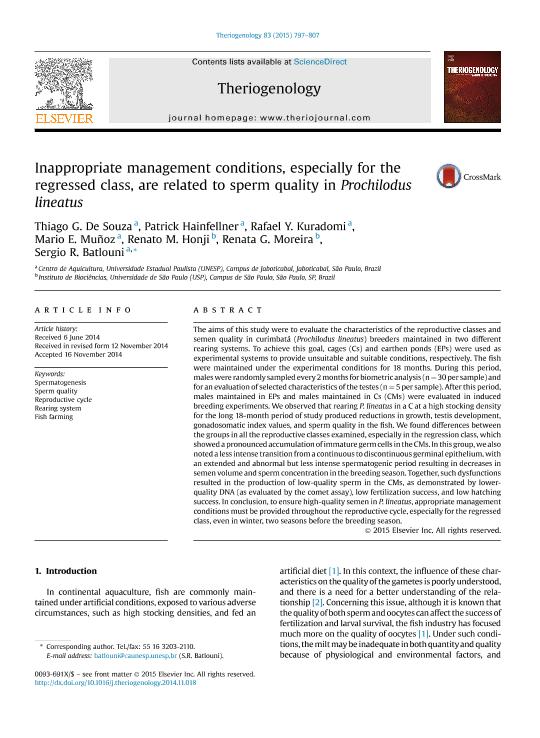Mostrar el registro sencillo del ítem
dc.contributor.author
de Souza Siqueira, Thiago Giordano

dc.contributor.author
Hainfellner, Patrick
dc.contributor.author
Kuradomi, Rafael Y.
dc.contributor.author
Muñoz, Mario E.
dc.contributor.author
Honji, Renato Massaaki

dc.contributor.author
Moreira, Renata G.
dc.contributor.author
Batlouni, Sergio R.
dc.date.available
2018-01-16T18:05:49Z
dc.date.issued
2014-11
dc.identifier.citation
Moreira, Renata G.; Muñoz, Mario E.; Hainfellner, Patrick; Batlouni, Sergio R.; de Souza Siqueira, Thiago Giordano; Kuradomi, Rafael Y.; et al.; Inappropriate management conditions, especially for the regressed class, are related to sperm quality in Prochilodus lineatus; Elsevier Inc; Theriogenology; 83; 5; 11-2014; 797-807
dc.identifier.issn
0093-691X
dc.identifier.uri
http://hdl.handle.net/11336/33440
dc.description.abstract
The aims of this study were to evaluate the characteristics of the reproductive classes and semen quality in curimbatá (Prochilodus lineatus) breeders maintained in two different rearing systems. To achieve this goal, cages (Cs) and earthen ponds (EPs) were used as experimental systems to provide unsuitable and suitable conditions, respectively. The fish were maintained under the experimental conditions for 18 months. During this period, males were randomly sampled every 2 months for biometric analysis (n = 30 per sample) and for an evaluation of selected characteristics of the testes (n = 5 per sample). After this period, males maintained in EPs and males maintained in Cs (CMs) were evaluated in induced breeding experiments. We observed that rearing P. lineatus in a C at a high stocking density for the long 18-month period of study produced reductions in growth, testis development, gonadosomatic index values, and sperm quality in the fish. We found differences between the groups in all the reproductive classes examined, especially in the regression class, which showed a pronounced accumulation of immature germ cells in the CMs. In this group, we also noted a less intense transition from a continuous to discontinuous germinal epithelium, with an extended and abnormal but less intense spermatogenic period resulting in decreases in semen volume and sperm concentration in the breeding season. Together, such dysfunctions resulted in the production of low-quality sperm in the CMs, as demonstrated by lower-quality DNA (as evaluated by the comet assay), low fertilization success, and low hatching success. In conclusion, to ensure high-quality semen in P. lineatus, appropriate management conditions must be provided throughout the reproductive cycle, especially for the regressed class, even in winter, two seasons before the breeding season.
dc.format
application/pdf
dc.language.iso
eng
dc.publisher
Elsevier Inc

dc.rights
info:eu-repo/semantics/openAccess
dc.rights.uri
https://creativecommons.org/licenses/by-nc-nd/2.5/ar/
dc.subject
Spermatogenesis
dc.subject
Sperm Quality
dc.subject
Reproductive Cycle
dc.subject
Rearing System
dc.subject
Fish Farming
dc.subject.classification
Otras Ciencias Biológicas

dc.subject.classification
Ciencias Biológicas

dc.subject.classification
CIENCIAS NATURALES Y EXACTAS

dc.title
Inappropriate management conditions, especially for the regressed class, are related to sperm quality in Prochilodus lineatus
dc.type
info:eu-repo/semantics/article
dc.type
info:ar-repo/semantics/artículo
dc.type
info:eu-repo/semantics/publishedVersion
dc.date.updated
2018-01-12T19:48:19Z
dc.journal.volume
83
dc.journal.number
5
dc.journal.pagination
797-807
dc.journal.pais
Estados Unidos

dc.description.fil
Fil: de Souza Siqueira, Thiago Giordano. Universidade Estadual Paulista Julio de Mesquita Filho; Brasil
dc.description.fil
Fil: Hainfellner, Patrick. Universidade Estadual Paulista Julio de Mesquita Filho; Brasil
dc.description.fil
Fil: Kuradomi, Rafael Y.. Universidade Estadual Paulista Julio de Mesquita Filho; Brasil
dc.description.fil
Fil: Muñoz, Mario E.. Universidade Estadual Paulista Julio de Mesquita Filho; Brasil
dc.description.fil
Fil: Honji, Renato Massaaki. Universidade de Sao Paulo; Brasil. Consejo Nacional de Investigaciones Científicas y Técnicas; Argentina
dc.description.fil
Fil: Moreira, Renata G.. Universidade de Sao Paulo; Brasil
dc.description.fil
Fil: Batlouni, Sergio R.. Universidade Estadual Paulista Julio de Mesquita Filho; Brasil
dc.journal.title
Theriogenology

dc.relation.alternativeid
info:eu-repo/semantics/altIdentifier/doi/http://dx.doi.org/10.1016/j.theriogenology.2014.11.018
dc.relation.alternativeid
info:eu-repo/semantics/altIdentifier/url/http://www.sciencedirect.com/science/article/pii/S0093691X14006360
Archivos asociados
